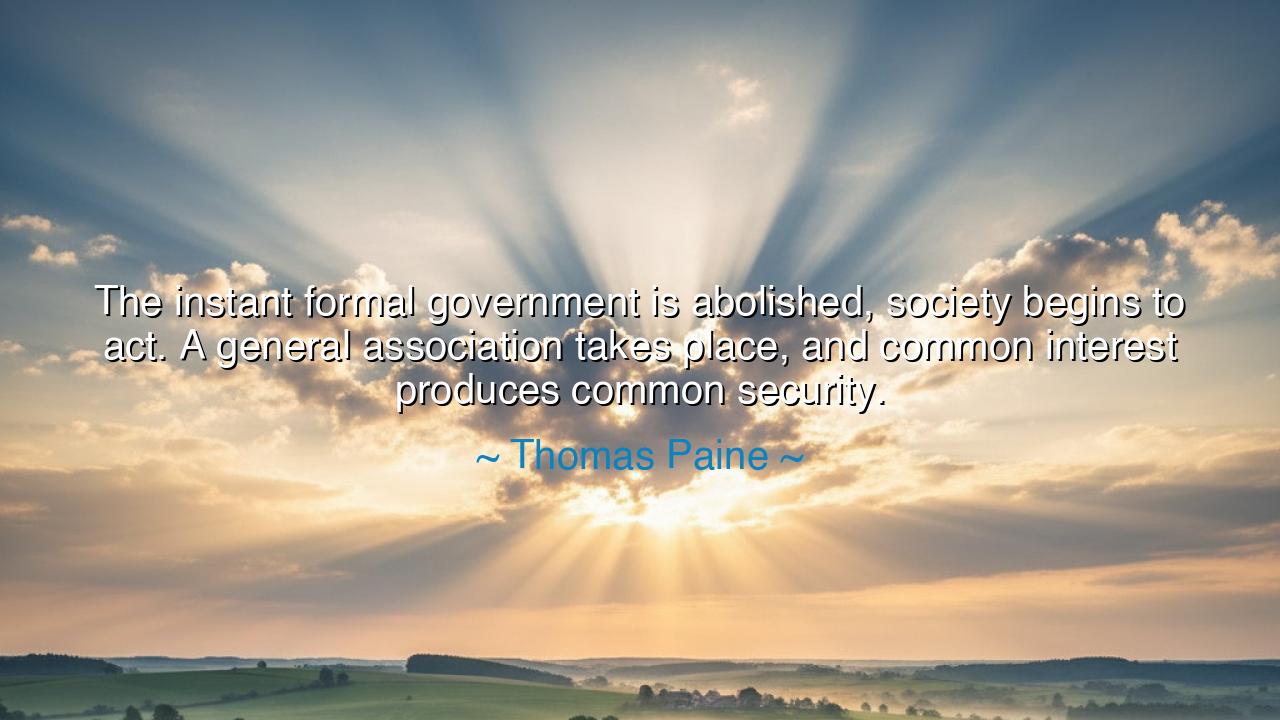
The instant formal government is abolished, society begins to
The instant formal government is abolished, society begins to act. A general association takes place, and common interest produces common security.






"The instant formal government is abolished, society begins to act. A general association takes place, and common interest produces common security." — Thomas Paine
Hear these words, O inheritors of liberty, and listen to the wisdom of Thomas Paine, that fiery prophet of revolution and defender of the common man. When he declared, “The instant formal government is abolished, society begins to act. A general association takes place, and common interest produces common security,” he spoke not as a destroyer of order, but as a believer in the natural virtue of mankind. He saw that society, born of compassion and mutual need, exists before kings, before parliaments, before laws written on parchment. His words burn with the conviction that when the machinery of power collapses, the living heart of humanity begins to beat freely once more — that men, when unshackled, are not beasts, but brothers.
The meaning of this quote lies in Paine’s faith in the natural order of human cooperation. He reminds us that formal government is not the source of order, but its servant. When he says that society “begins to act” in the absence of formal rule, he does not mean chaos, but spontaneous harmony — the instinct of people to come together, to protect one another, to rebuild. Paine believed that human nature, though flawed, carries within it a divine impulse toward unity and care. It is not the whip of law that keeps civilization alive, but the bonds of common interest — the shared understanding that one’s good is tied to the good of all. Governments, in his view, arise only when those natural bonds fail or grow weak.
The origin of these words is found in Paine’s immortal work, Common Sense (1776), the pamphlet that ignited the fire of the American Revolution. In those days, the colonies groaned under the weight of imperial rule. Many feared that without the crown, chaos would follow — that without the structure of government, men would devour one another. But Paine, seeing deeper into the soul of liberty, declared that society itself was the true foundation of order. He wrote that when tyranny ends, men do not fall into anarchy, but rise into cooperation — forming voluntary associations, communities, and councils bound not by force, but by necessity and goodwill. His words were a declaration of faith in the people themselves, a thunderous rejection of the idea that authority alone keeps civilization intact.
To understand this, look to history and witness how, even in the absence of rule, human solidarity has arisen like dawn after the night. When natural disasters strike, when empires fall, when governments crumble, it is not law that saves the helpless — it is the hand of one neighbor reaching out to another. Consider the aftermath of earthquakes, floods, or wars: strangers become rescuers, communities rebuild without command. In 1945, when war-torn Europe lay in ruin, it was not the governments alone that restored civilization, but the people — farmers, workers, mothers, and teachers — who, united by common interest, forged a new peace from the wreckage. This is the power that Paine recognized: the eternal capacity of society to organize itself from within, guided not by decree, but by decency.
Yet Paine’s words also carry a warning. For he does not glorify the destruction of government, but urges us to remember that government is only a tool, and like all tools, it must never master its maker. When formal institutions forget their purpose — when they cease to serve the people and begin to serve themselves — they become obstacles to the very harmony they were meant to preserve. Paine calls us to trust in our own collective wisdom, to remember that justice and compassion are not born in palaces, but in the hearts of ordinary men and women. He believed that the closer power lies to the people, the purer it remains; the farther it drifts, the more it corrupts.
In his vision, society is the true government, and common interest is the true law. The village, the marketplace, the fellowship of neighbors — these are the real foundations of peace. When individuals act with empathy, when communities unite around shared purpose, they create the very security that tyrants claim only they can provide. Paine’s insight, then, is a call to remember our innate capacity for self-governance — that freedom is not the absence of structure, but the presence of shared responsibility. His faith in the people was not naïve, but heroic: he believed that liberty, when guided by conscience, can give rise to greater order than any throne or empire ever could.
So let this be your lesson, O sons and daughters of democracy: do not fear the absence of rulers, but fear the loss of your own virtue. Governments will rise and fall, but society endures, bound by the invisible threads of human compassion. Be not dependent upon distant powers to secure your peace; build it among yourselves. Help your neighbor, guard your community, uphold justice not because it is commanded, but because it is right. For when men act from common interest and moral strength, no tyranny can enslave them, and no collapse can destroy them. As Paine teaches, when formal government fails, society begins to act — and in that moment, we glimpse the divine truth that the highest form of order is not imposed from above, but born from within the human heart.






AAdministratorAdministrator
Welcome, honored guests. Please leave a comment, we will respond soon